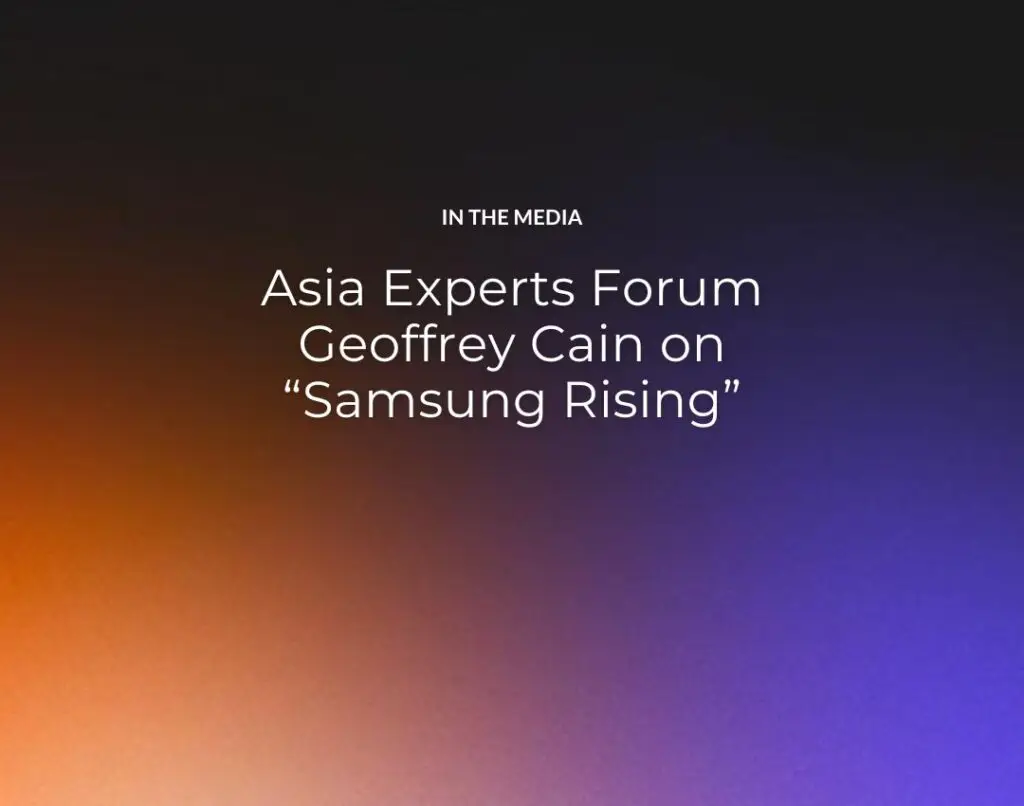22 February 2022


Geoffrey Cain is an award-winning foreign correspondent, author, technologist, and scholar of East and Central Asia. His first book, Samsung Rising: The Inside Story of the South Korean Giant That Set Out to Beat Apple and Conquer Tech, from a decade of his coverage of the world’s largest technology conglomerate, was published in March 2020 by Currency at Penguin Random House. It was longlisted for the Financial Times and McKinsey Business Book of the Year award, and was named a Cult of Mac best tech book of 2020. A former correspondent at The Economist, Cain is a regular commentator in The Wall Street Journal, Time, Foreign Policy, The New Republic and The Nation, a contributing editor at The Mekong Review, and a frequent guest on CNN, MSNBC, BBC and Bloomberg. Cain writes about the ways that technology is upending our lives, communities, governments and businesses. His work takes him to the world’s most authoritarian and far-off places, from inside North Korea to the trans-Siberian railway across Russia, from investigations into genocide in Cambodia to experiments in technological surveillance in China. Cain is sought out as a consultant on government, business and technology, having advised the World Health Organization, Open Government Partnership, the United Nations humanitarian affairs office, and major multinational corporations and hedge funds. A Fulbright scholar, he holds a master’s with distinction from London’s School of Oriental and African Studies and a bachelor’s at The George Washington University, which he attended on a music scholarship. He is a term member of the Council on Foreign Relations.
Jessie Miller CMC ’23 interviewed Mr. Geoffrey Cain on February 15, 2022.
Photograph by Marion Ettlinger and biography courtesy of Geoffrey Cain.
Among the American public, there is some animosity toward “big tech.” How does public sentiment in South Korea toward technology conglomerates like Samsung compare, especially given past corruption scandals?
For a long time, South Koreans have had a love-hate relationship with Samsung and with its chaebol groups. There is a misconception that all South Koreans worship Samsung or that all South Koreans want to overthrow it. It is a love relationship because the South Koreans see the chaebol as having been largely responsible for the success of the nation and the nation building project under Park Chung-hee. The leaders who came after were enormously successful at implementing an economic model that was derided in the liberal West because it was seen as too heavy handed in terms of state intervention. Westerners thought that South Korea was going to rack up heavy debts, create inflation, and keep the people in poverty. The irony is that in the 19th century, Germany, Britain, Japan, and numerous other countries enacted similar models to what South Korea did in the 1960s and 1970s.
While this industrial model was extremely successful, it came at an enormous cost. Even today, South Korea suffers from social problems, such as high suicide rates, high rates of elderly poverty, and wealth inequality. South Korea has this dual identity of being extremely high tech, but simultaneously having this dark underbelly of frequent corruption scandals. This is why many South Koreans also hate the chaebol. It is rooted in the fact that the families running the chaebol are responsible for many of the country’s problems. People feel that they have unfairly benefited from the regimes of the past that were too pro-business, and now is the time to simply topple them and adopt antitrust policy.
The U.S. has also had a similar reckoning in recent years with the rise of big tech. When I was starting as a technology journalist, there was enormous optimism about the future of Silicon Valley. There was a sense that social media and smartphones would solve many of our problems and that we would become more democratic. A lot of people are now disappointed and distrust big tech. One of the big conversations in Washington right now is over how to get these Silicon Valley firms working within the national interest. These are private companies in a free market, and they can do whatever they want. Still, there is a growing discussion over the possibility of a return to an industrial policy with limited government intervention, such as one that creates incentives and subsidies for companies to develop products in the national interest like semiconductors.
More and more scholars and policymakers have been turning to the East when it comes to industry. What lessons can be learned from the South Korean experience and the Samsung experience? Obviously Korea has its own history and society, which is structured very differently from the American system. But there are still lessons that can be gleaned about the importance of setting up programs, such as tax penalties if a company does something wrong.
There is a bigger global moment that is happening related to technological conglomerates. The neoliberal order that has dominated the world, at least the Western world, is in decline. Reagan and Thatcher changed a lot in terms of how the international monetary system works and how financing works, and there was an era of free trade, free markets, and globalization. But now, even in America, there is a growing consensus that the neoliberal order is probably nearing its end, and something new is coming. This is why there is a return right now to studying industry and studying companies like Samsung, which were so successful with this nexus between government and private business.
How have the legal battles between Samsung and Apple shaped the landscape of international intellectual property law and jurisprudence for businesses across the world?
When historians go back, they will look at the battle of Apple versus Samsung as one of the business rivalries that defined what global tech looks like. There were two styles of innovation in this lawsuit, and it was not as simple as Samsung copied Apple. Apple under Steve Jobs pursued a vision of innovation, the “big bang.” This meant pursuing projects and products that were going to change everything. This is a very successful model, but it is also a very risky endeavor. Steve Jobs failed numerous times before he reached the pinnacle of his success with the iPhone. There were a lot of very lucky circumstances that allowed Apple to flourish under Steve Jobs, and he didn’t just show up and change everything. Apple did come out with the iPhone that really turned the world on its head. Almost every single innovation that’s come out since 2007, the year of the iPhone, stems from smartphone technology in some way.
This was an enormous upset. A lot of these competitors, including Samsung, Nokia, and Microsoft, were all blowing off the concept of the smartphone. They thought that the iPhone was going to fail. It took the competitors awhile to figure out that Apple was onto something and that this might actually be the future. At the time, Samsung was at the bottom of the heap. It was losing market share and quickly declining, but it had just come off a wonderful victory against the Japanese giants that had dominated in the past. It took about two or three years for Samsung executives to realize that they had to act. It is true that they did imitate and copy parts of the iPhone. What they were doing was an old style of East Asian innovation that has existed for a long time in Japan and Korea. It is this idea of incremental innovations; in Korea, it is called kaesong and in Japan, it is called kaizen. The idea is that you don’t pull together one big product that’s going to destroy everything and change the markets. Instead you work incrementally by picking out little pieces of the tech that you can change and improve over time, releasing the product in smaller iterations with little splashes of innovation that make it better.
This is what Samsung reverted to when Apple released the iPhone. They went back to their old model of studying the markets and looked at what their competitors were doing. When the iPhone looked like it was going to succeed, they wanted to make a product like it. As a result, they released the Galaxy. This was the moment that started the Apple-Samsung rivalry. Early in the years of this rivalry, Apple was actually the one that started stagnating. Between the years 2010 and 2015, there wasn’t much innovation going on, and there was talk that Apple might actually fall behind. It was during these years that Apple began studying Samsung, and following Samsung to catch up. In the end, a judge did rule in multiple court cases that Samsung did indeed copy many of the features of the iPhone leading to massive settlements. Still, the entire victory was pyrrhic for Apple since it didn’t really accomplish anything.
Due to the Apple-Samsung rivalry, people began thinking about how patents and intellectual property work. Intellectual property law is 150 years old and is designed to protect a product like a saddle or milk jug or carpet. These are things that anybody can make, not like smartphones and computers. The problem with those patents is that when you make a milk jug it is a simple glass. That’s easy to patent. When you make a smartphone, you need to deal with many components, complicated software, and supply chains all over the world. This raises questions of whether it is fair to file a patent on a rectangular device that has a screen that opens up to be used for different tools. That’s such a vague generic thing that could destroy the entire market by creating a monopoly based in general patents.
There was a realization in the 21st century that nobody is going to be able to create really innovative tech if every single black rectangle is patented. That’s one of the defining legacies of this lawsuit and business battle. This is also going to be a big area in technological horizons such as biotech and artificial intelligence.
In your book, Samsung Rising: The Inside Story of the South Korean Giant That Set Out to Beat Apple and Conquer Tech, you discuss how the South Korean media was quite gentle in reporting the issues with the Galaxy Note 7 phone. Was this a result of cultural norms, or are there more formal legal structures in place limiting speech and protecting the Samsung brand?
The reality is that Samsung has enormous political power and regulatory power. Lobbying is illegal in South Korea, but companies such as Samsung manage to get around that through their informal relationships. There was one case about ten years ago where a South Korean lawmaker said that she received a golf bag full of Korean currency, and she returned it. That sort of bribery still exists in South Korea. South Korea is a very new democracy. Also, once you dig deep into the big names, the big companies, the big government, and the leaders, you will often find that there’s a lot going on under the surface. I’ve been surprised at just how embedded business and government can be. That creates a culture of corruption, where it is seen as acceptable to give bribes to preserve your relationship with someone who is important and influential.
The best example of this in more recent years is the impeachment of President Park Geun-hye, who was the daughter of the dictator, Park Chung-hee. It turned out that Samsung had gifted horses and other gifts illegally. The soon-to-be chairman of Samsung was imprisoned for a short while, and he later returned to prison. The President was stripped of her office and she was sentences for over 20 years. There were enormous protests that happened in Seoul during that time. The people of South Korea, through their own peaceful civil disobedience, managed to unseat a president and to put a powerful business leader behind bars.
Often there are corruption scandals involving a big businessman, who may be convicted of something like tax evasion, apologize, and then get a two year prison sentence, if not let off with a presidential pardon or something similar. This pattern repeats itself. But with the Park Geun-hye impeachment, it was the first time that an influential business leader had received five years in prison; he served only one year at the beginning, but nevertheless, he got a real prison sentence and didn’t just get off lightly.
Your book touches upon the idea of Samsung being “too big to fail.” How much of a liability is this to the South Korean economy? What policy approaches, if any, might help mitigate the problem?
It is not healthy for the South Korean economy. It is a model that works for big growth and for big industry. Having this “Republic of Samsung” was brilliant for digging a country out of poverty. South Korea was one of the poorest countries in the world; it was poorer than Sudan, back in the 1950s and had no hope for the future. It had very few natural resources. It was surrounded by enemies, after being decolonized from Japan. It suffered terribly during the Korean War that killed 2 million people. It faced devastation beyond anything that we can comprehend today.
South Korea needed a way out of that and it chose big industry and big business. However, the world has changed. We now live in a much more software-dominated world rather than a hardware-dominated world in terms of what produces growth. Heavy industry creates growth in specific geographic locations, not everywhere. Software is perfectly scalable, meaning it goes everywhere, and all the wealth that’s being created from it is sucked up into one place: Silicon Valley. That’s why there are extremely wealthy and extremely powerful barons today, like Elon Musk. South Korea cannot simply turn to big industry to keep things going.
Part of the solution is definitely antitrust policies. One of the big ruts in South Korean policy is that there is no antitrust tradition. This tradition started in America in the late 19th century, with the big robber barons and the big oil and railroad barons who controlled massive infrastructure that was important to national interests. They could gouge prices, treat workers badly, and hold the government in contempt. Theodore Roosevelt was the first president who went on the attack and decided that this system was too destructive. Antitrust was the only solution. Antitrust is a field that has a long tradition in America. In the European Union, they’re even stricter about it. Every day in the news there is some kind of fine against tech companies because they did something illegal in this way.
The people at the top of the South Korean corporate governance model have almost total power to do what they want. They’re like feudal kings. South Korea has tried many times to amass the power and the political capital needed to break up these big chaebol conglomerates. It is simply not possible because the entire nation is structured around them. If South Korea can’t engage in a strong antitrust regime and break up Samsung or LG, the country will be stuck in this cycle of corruption scandals every few years.
How did the Asian Financial Crisis in the late 1990s impact Samsung and South Korean businesses more broadly?
The Asian Financial Crisis of 1997 was the turning point for much of Asia, including South Korea. If you’re studying the history of Asia, you can study it in terms of pre-1997 and post-1997 Asia. South Korea before 1997 had an industrial model. After 1997, the economy and society underwent some major shifts that challenged the idea that the conglomerates should continue to rule the country. Should it keep giving away this enormous amount of power to these conglomerates in exchange for their nation-building abilities? This debate has continued until this day, and especially during that impeachment in 2017. It remains unclear what South Korea will look like if there are no more Samsungs.
The old ways are unhealthy for Korean society; they contribute to wealth inequality, unemployment, and the concentration of power in a few businesses. South Korean leaders in all political circles have failed to envision a future for the country without conglomerates, lacking the imagination and the wherewithal to actually reform the system. Usually they decide to fall back into the chaebol system because it is what they know and see as safe. If they go up against it, there are lots of vested interests and supporters and lobbyists who will throw money against them and try to shut them down. After 1997, there have been changes in culture and society, but not much in business and government relationships.
Throughout the book there are examples of people working their way up through the corporate hierarchy at Samsung. Is this reflective of economic mobility in South Korea more generally, or is this phenomenon particular to Samsung?
In the growth years of South Korea, you could have a 10th grade education and start at Samsung on the factory floor and rise to the position of Vice President. That was the Samsung model in the Cold War years. This has changed quite a bit. As a result of the wealth inequalities that exist today, the society is much more stratified culturally between classes. Consider class in the United States, for example. There is a class of software developers in Silicon Valley who are certainly very intelligent and very good at what they do. There is also a class of people who are essentially their servants: the Uber drivers, the Amazon truck drivers, the warehouse workers. These are the people who keep the economy churning, and the most vulnerable during the pandemic. The others, whose job is to develop software or to manage a company, exist within their own sphere. They are safe and they work remotely and they don’t have to worry about lockdowns and the pandemic as much. That’s one of the fundamental political and social divides of our world today and it has really come out in the pandemic.
I bring this up because this fundamental structure is also what defines the chaebol in South Korea. You might be one of the elite few who has been allowed into the gates of this Samsung empire, in which case you’re going to raise yourself to the level of vice president if you just stick around for twenty or thirty years. You are going to be among this elite group of people who hold privileges in society. The other option in South Korea is that you might have to just become a contract worker your entire life, including if you are good at computers. You might develop some software in your free time as a contractor, but then you’ll also have to drive a taxi or work at a local shop or as a security guard. South Korea has really become a two-tiered society, where the hallmarks of success are entering Samsung and everyone else is lumped together into this mega-class of contractors and engineers who haven’t made it. Their job is essentially to serve Samsung and to make Samsung a bigger company through their contracts.
Jessie Miller CMC ’23
Read more about Geoffrey Cain’s new book, Samsung Rising at Forbes
See Also:






